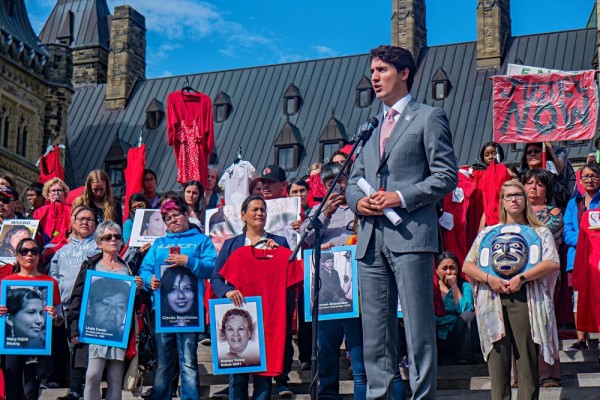The Hub is getting increasingly desperate to boost the flagging Cons
Hopes for a right-wing makeover of our country have been spiked in just a matter of weeks by Trumpism

Conservative Party leader Pierre Poilievre. Photo from Flickr.
Pity the poor Hub. Mere weeks ago, it appeared that the Conservative Party it cheers on so ardently would cruise to victory in the coming federal election. Canadians had tired of Justin Trudeau after nine years as prime minister and new Conservative leader Pierre Poilievre had rocketed up the polls by promising to defund the CBC and cancel the subsidies our news media have been collecting for the past five years. But then Trudeau resigned and was replaced by the more cerebral Mark Carney, whose acumen puts career politician Poilievre to shame. Donald Trump then slapped massive tariffs on Canadian products, sparking a trade war that has brought us together like seldom before. Given this newfound spirit of nationalism, axing the CBC is about the last thing voters want to sign off on. Worst of all, Poilievre’s right-wing policies hew a bit too closely to Trump’s and he rightly suffers from guilt by association.
This is thus shaping up as a one-issue election, rendering moot much of the groundwork laid by The Hub, which was founded four years ago by two faculty members of the Munk School of Global Affairs & Public Policy at the University of Toronto. The school was controversially named after Barrick Gold founder Peter Munk, who actively promoted far-right policies including environmental de-regulation, in exchange for a $6.4 million donation in 1997. Munk gave it another $5 million in 2006 and $35 million more in 2014, which sparked controversy not only for the $16 million tax credit it somehow returned him, but also for its secret provision that the Munk School take advice from Barrick’s advisory board, which then included former US President George H. Bush and former Prime Minister Brian Mulroney. The Canadian Foreign Policy Institute has argued that Munk’s donations resulted in the school being “shaped in his hard right image.”
The Munk School has become highly influential with its vast resources, sponsoring an eight-month Munk Fellowship in Global Journalism for 20 applicants annually, the raucous biannual Munk Debates and an annual $50,000 award for the world’s best non-fiction book on foreign affairs, which the Halifax Examiner quipped was “part of a larger effort to reimagine Canada as a right-wing American Libertarian fantasy.”
The Hub was founded in 2021 by Munk School faculty members Rudyard Griffiths, a former broadcaster, and Sean Speer, a former advisor to Conservative Prime Minister Stephen Harper, in conjunction with the think tank Centre for Civic Engagement, a registered charity funded by right-wing foundations. Its naked partisanship follows a trend to so-called think tank journalism, under which The Economist quipped that “the divide between having ideas and reporting on them is dissolving.” The Hub has also found a profitable niche in publishing content paid for by clients including Telus, Toronto’s Pearson Airport and the Digital Media Association of foreign streamers, which renders somewhat suspect The Hub’s advocacy on issues affecting them, such as the Online Streaming Act (full disclosure: I have written several columns for The Hub, which also published an excerpt from my new book Tomorrow’s News: How to Fix Canada’s Media).
The Hub is so well funded that it offers an annual policy prize of $50,000 to contestants under 40 and recently donated the $22,248.58 it received from Google under the Online News Act to the March of Dimes. That means The Hub has now hypocritically collected payments under the Online News Act it has been so harshly critical of it because it claims the act has eroded public trust in the news and has harmed journalistic objectivity. The Hub loudly refused to accept earlier government subsidies given out under the $595 million media bailout announced in 2019, even signing a so-called Ottawa Declaration on Canadian Journalism calling on media to stop taking government subsidies. Accepting a government-ordered subsidy from Google and then donating it to charity qualifies as little more than a political stunt that not only diverts funding intended for journalism but reveals The Hub’s partisan stripes even more clearly.
The Hub’s content shows a decided desperation to influence the election in favour of the Tories, including a column by Speer arguing absurdly that Trump’s tariffs aren’t the biggest current threat to Canada, which he claims is instead a supposed national unity crisis. An article that carries the counterintuitive headline “Only Boomers are really concerned about Trump this election” is illustrated with a photo of a senior wearing a hearing aid embracing Carney. It cites recent polling that shows only 16 percent of those in the 18-29 age group think Trump is one of the two most important election issues, compared with 50 percent of seniors, and claims that young Canadians are more concerned with the “affordability crisis, soaring home prices, and a welfare system tilted strongly in favour of seniors.” The Hub’s dreary media podcast Full Press shows even more desperation, even attacking the Columbia Journalism Review recently over its article on the existential threat to Canadian media if Poilievre is elected, claiming it omitted comment from conservatives and complaining that it was labelled Analysis instead of Opinion.
Most revealing of all, however, was a so-called “Deep Dive” by Heather Exner-Pirot and Michael Gullo of the Business Council of Canada (BCC) headlined “Time to move from talk to action on regulatory reform.” It was a barely readable 2,900-word criticism of the 2019 Impact Assessment Act, a sweeping piece of federal environmental legislation also known as Bill C-69 which the BCC has opposed from the start. “We don’t need overregulation,” it argues. “Somewhere along the way, we developed a system that sees the people and companies that build things in Canada—the mines, pipelines, refineries, power plants, ports, railroads, and roads—as adversaries from whom the public needs defending.” Poilievre has promised to repeal the IAA within 60 days if elected. “Our approaches to approving and permitting projects have evolved into an albatross: a burden on those who would build and invest in our country,” argue Exner-Pirot and Gullo, who had a similar 3,000-word column published in The Hub last May. The column included no disclaimer that it had been paid for by the BCC, but given The Hub’s past practice of charging to publish such content, I queried them on the matter only to receive no answer to my email.
When most Canadians talk about regulatory reform, they mean enacting more effective regulations to rein in the power of corporations to gouge us so effectively, as the Trudeau government did recently by removing the so-called “efficiencies” defence from the Competition Act in light of the way its has hamstrung regulators for decades, as illustrated so ably in the delightful new book The Big Fix: How Companies Capture Markets and Harm Canadians. When conservatives like those at The Hub talk about regulatory reform, they mean removing all regulation, all government oversight, and likely even all government itself, as is now being commenced south of the border under the libertarian playbook exposed by the classic 2017 book Democracy in Chains: The Deep History of the Radical Right’s Stealth Plan for America.
How truly deflating it must be for The Hub to have its hopes for a similar makeover of our country spiked in a matter of weeks by Trumpism. It was no doubt licking its chops over what regulations to remove first and which changes in government policy would take priority, but its expected victory lap has reverted to it again weakly trying to help its favoured Conservatives along as they again vainly chase the more prudent Liberals.
Marc Edge teaches Media & Communication at University Canada West in Vancouver. His books and research on Canadian media can be found online at www.marcedge.com.










